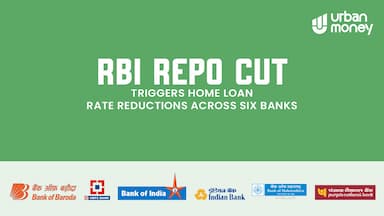Home Loan for Plot and Land
A plot loan is a type of mortgage. You can typically use the funds to purchase a piece of land in your dream location for constructing a home. Unlike home loans, which cover land acquisition and house construction within a specific timeframe, a plot loan is solely designed to purchase land. Thus, you can build your home whenever you are ready without being constrained by a fixed timeframe. However, before deciding on whichever option you find appealing, it is prudent to be well aware of both plot loans and home loans. So that you can choose the one that perfectly aligns with your preferences and needs. Hence, Urban Money presents details such as typical plot loan interest rates, benefits, types, eligibility criteria, required documents, applicable fees, and more.
- Personalized Home Loan solutions
- Expert guidance
- Application assistance
- Credit score discussion
- Home Loan Interest rate comparison
Table of Content


Last Updated: 7 February 2026
Plot Home Loan Interest Rates
Let’s look at the prevailing plot loan interest rates from various banks across India.
| Bank | Interest Rates (p.a) |
| SBI | 9.40% onwards |
| HDFC | 8.50% onwards |
| Axis | 8.70% onwards |
| Canara | 9.25% onwards |
| Union Bank of India | 8.40% onwards |
| Bank of Baroda | 8.40% onwards |
| PNB | 9.50% onwards |
| ICICI | 7.85% onwards |
| Federal Bank | 9.05% onwards |
| Karnataka Bank | 9.12% onwards |
| Maharashtra Bank | 8.50% onwards |
Types of Plot Loans
Plot purchase loans come in various types to cater to different needs. Understanding these types can help you choose the one that perfectly aligns with your requirements. Let’s scroll down and learn about different types of plot loans:
Raw Land Loan
Raw land refers to purely undeveloped plots. I.e., lands without utilities or amenities like sewers, roads, or electricity. Securing raw land loans might be difficult as lenders consider it as risky. Consequently, you may encounter unfavourable terms, including high interest rates, a lower loan-to-value ratio (LTV), and a shorter repayment period, among other factors.
Unimproved Land Loan
Unimproved land refers to land with some basic utilities and amenities but not enough to support home construction. For example, the land may have water access but not electricity or roads. This type of loan is slightly easier and cheaper to obtain than a raw land loan but still more challenging and costly than an improved land loan.
Improved Land Loan
It is a type of plot purchase loan for owning land with adequate utilities and amenities to support a building/home. This type of land may have access to water, electricity, roads, sewer systems, and other pertinence that are inevitable for residential properties. Moreover, improved land loans are generally more cost-effective and less challenging to obtain, as lenders typically perceive them as less risky. Thus, the borrower can enjoy a lower interest rate, higher loan-to-value ratio (LTV), and longer repayment periods than other types of land loans.
Apply Home Loan For Different Property Types
Plot Loan Benefits
Here are some of the major benefits you can expect by availing a home loan for plot purchase only:
- You can finance funds solely to purchase a plot and then build a house on it later at your discretion.
- You can obtain a lower interest rate than other types of loans, as plot purchase loans come under a secured/collateral loan.
- You can benefit from a longer repayment tenure, spanning up to 15 years, making it a more borrower-friendly financing option.
- You can enjoy tax deductions of up to Rs. 1.5 lakh per year on principal repayment (Section 80C) and up to Rs. 2 lakh per year on interest payment (Section 24).
- You can also avail of features such as zero pre-payment penalty, lower processing fees, moderate eligibility criteria, minimal documentation, and more.
Plot Home Loan Documents Required
The following documents are required for a plot loan:
- Proof of Identity: Aadhaar card, PAN Card, voter ID, or Driver’s License.
- Proof of Address: Utility Bills, Passport, Driving License, or ration card.
- Proof of Income: Salary slips, bank statements, and income tax returns.
- Other Documents: A duly filled and signed application form, two passport-sized photographs, a cheque for the loan processing fee, and property documents (if applicable).
Explore Home Loans for Plot and Land from Top Banks
Plot Home Loan Eligibility Criteria
The typical eligibility criteria for a home loan for plot purchase are as follows:
- You must be an Indian citizen.
- You must be somewhere between 18 to 65 years old.
- You must have a regular and stable source of income that covers the loan repayment, either from salaried employment or self-employment.
- You must have a good credit history; preferably, lenders view a credit score of 700 or above as ideal.
- You must provide the plot details that you want to purchase, such as the location, size, layout, approval, title deed, NOC, etc.
Housing Loan for Plot and Land – Fees and Charges
In addition to the plot loan interest rate, there are certain fees and charges you should be aware of before initiating your application. These primarily include the processing fee, prepayment fees, and late payment fees. Thus, hereunder, we outline the applicable fees for a plot purchase loan from leading lenders in India.
| Bank | Processing Fee | Prepayment Charges | Late Payment Charges |
| SBI | 0.35% of the loan amount | Nil | 2% p.a. (in addition to the applicable interest rate) on the overdue amount |
| HDFC | Up to 0.50% of the loan amount or Rs. 3000/- whichever is higher | 2% of the outstanding amount | Up to 18% p.a. on overdue instalment amounts |
| Axis | 1% of the loan amount + Rs. 5,000 login fee | 3% of the outstanding amount | Up to 24% p.a. on overdue instalment amounts |
| Canara | Up to 0.50% of the loan amount | 2% of the outstanding amount | Up to 24% p.a. on overdue instalment amounts |
| Union Bank of India | Up to 0.50% of the loan amount | 2% of the outstanding amount | Up to 18% p.a. on overdue instalment amounts |
| Bank of Baroda | 0.50% of the loan amount, subject to a minimum of Rs. 8,500 and a maximum of Rs. 25,000. | Nil | Up to 24% p.a. on overdue instalment amounts |
| PNB | 1% of the loan amount | 2% of the outstanding amount | Up to 24% p.a. on overdue instalment amounts |
| ICICI | 1% of the loan amount or Rs. 11,000/- whichever is higher | 2% of the outstanding amount | Up to 24% p.a. on overdue instalment amounts |
| Federal Bank | Up to 0.50% of the loan amount | Nil | Up to 24% p.a. on overdue instalment amounts |
| Maharashtra Bank | 0.25% of the loan amount or Rs. 25,000/- whichever is higher | 2% of the outstanding amount | NA |
| Karnataka Bank | 0.25% of the loan amount | 2% of the outstanding amount | Up to 24% p.a. on overdue instalment amounts |
By Professions
By Amount
By CIBIL Score
By Salary
By Other
Differences Between Home Loan and Land Loan
The following table summarises the key differences between home loans and land loans:
| Aspect | Home Loan | Land Loan |
| Purpose | For both purchasing land and constructing a home on it within a specific time frame. | For solely purchasing land but having the freedom to build a house on it in the future. |
| Tax benefits | Home loans offer tax benefits on both the principal and interest payments under Section 80C and Section 24 of the Income Tax Act, respectively. | Land loans offer no tax benefits unless the borrower constructs a house on the purchased plot within a specified period. |
| Tenure | Maximum loan tenure is typically up to 30 years. | Maximum loan tenure is typically up to 15 years. |
| Loan to Value Ratio (LTV) | Home loans provide a higher LTV of up to 90% of the property value. | Land loans provide a lower LTV of up to 80% of the plot value. |
Tax Benefits on Plot Loans
The tax benefits on plot loans depend on what you intend to do with the plot. Namely, you can only be eligible for these benefits if you construct a house on the plot that you bought with the loan amount. However, eligible candidates can enjoy a tax deduction of up to Rs. 1.5 lakh per year on the principal repayment under Section 80C. And up to Rs. 2 lakh annually on the interest payment under Section 24. These deductions are subject to certain conditions and limits, such as property ownership, loan purpose, loan date, etc.
Things to Remember When Applying for a Plot Loan
Consider the following tips to ensure a smooth and successful application process regarding a home loan for plot purchase:
- Research Thoroughly: Understand the terms and conditions such as plot loan interest rate and associated fees with different plot loans offered by various banks.
- Check Your Credit Score: A good credit score enhances your eligibility and may help you negotiate better terms and rates.
- Evaluate Loan-to-Value Ratio (LTV): As different banks may offer varying Loan-to-Value (LTV) ratios, choose a lender whose LTV ratio aligns with your financial capacity.
- Review Repayment Options: Evaluate the repayment options and assess their flexibility (if applicable), including factors such as tenure and EMI amounts.
- Verify Property Documents: Ensure that the land you intend to purchase has complete and clear documentation, as banks often require thorough scrutiny of property documents.
- Understand Fees and Charges: Be aware of processing fees, late payment charges, and any other fees applicable to the plot mortgage loan.
- Seek Professional Advice: Relying on financial or real estate experts can also aid you in making a well-informed and cost-effective decision regarding your plot loan.
Apply Home Loan in Your City
Quick Links
Home Loan by Nationalized Bank
Home Loan by Private Bank
- Reliance Capital Home Loan
- YES Bank Home Loan
- RBL Bank Home Loan
- IDFC FIRST Bank Home Loan
- DCB Bank Home Loan
- Federal Bank Home Loan
- ICICI Bank Home Loan
- karur Vysya Bank Home Loan
- Axis Bank Home Loan
- CITI Bank Home Loan
- HDFC Bank Home Loan
- Housing Development Finance Corporation Home Loan
- HDFC Sales Home Loan
- Kotak Bank Home Loan
- HSBC Home Loan
- IndusInd Bank Home Loan
- LIC Housing Finance Home Loan
- IDBI Bank Home Loan
- karnataka bank Home Loan
Home Loan by NBFC
- Clix Capital Home Loan
- Vastu Housing Finance Home Loan
- Aadhar housing Finance Home Loan
- Hero FinCorp Home Loan
- Muthoot Finance Ltd Home Loan
- Edelweiss Financial Services Home Loan
- Cholamandalam Finance Home Loan
- Piramal Finance Home Loan
- SMFG India Credit Company Ltd Home Loan
- Ujjivan Small Finance Bank Home Loan
- Capri Global Home Loan
- Hero Housing Finance Home Loan
- Poonawalla Fincorp Limited Home Loan
- Capital First Ltd. Home Loan
- IndiaBulls Home Loan
- IIFL Finance Home Loan
- L&T Finance Home Loan
- DHFL Home Loan
- Tata Capital Housing Finance Limited Home Loan
- Home First Finance Company Home Loan
- Punjab National Bank Housing Finance Home Loan
- Godrej Housing Finance Home Loan
- Aditya Birla Finance Limited Home Loan
- Bajaj Finserv Home Loan
Home Loan Calculators
Bank wise Home Loan Calculators
- Axis Bank Home Loan Calculator
- Canara Bank Home Loan Calculator
- Idfc First Bank Home Loan Calculator
- Hsbc Home Loan Calculator
- Indusind Bank Home Loan Calculator
- Hdfc Bank Home Loan Calculator
- Kotak Bank Home Loan Calculator
- State Bank Of India Home Loan Calculator
- Aditya Birla Finance Limited Home Loan Calculator
- Idbi Bank Home Loan Calculator
- Iifl Finance Home Loan Calculator
- Karur Vysya Bank Home Loan Calculator
- Piramal Finance Home Loan Calculator
- Tata Capital Housing Finance Limited Home Loan Calculator
- Union Bank Of India Home Loan Calculator
- Punjab National Bank Home Loan Calculator
- Bank Of India Home Loan Calculator
- Bank Of Baroda Home Loan Calculator
- Lic Housing Finance Home Loan Calculator
- Punjab Sind Bank Home Loan Calculator
- Indian Bank Home Loan Calculator
- Bank Of Maharashtra Home Loan Calculator
- Citi Bank Home Loan Calculator
- Rbl Bank Home Loan Calculator
- Karnataka Bank Home Loan Calculator
- Federal Bank Home Loan Calculator
- Deutsche Bank Home Loan Calculator
- Yes Bank Home Loan Calculator
- Icici Bank Home Loan Calculator
Bank Wise Home Loan Interest Rate
- Bank of Baroda Home Loan Interest Rate
- Union Bank of India Home Loan Interest Rate
- Indian bank Home Loan Interest Rate
- Punjab & Sind Bank Home Loan Interest Rate
- State Bank of India Home Loan Interest Rate
- Punjab National Bank Home Loan Interest Rate
- Canara Bank Home Loan Interest Rate
- Bank of India Home Loan Interest Rate
- Bank of Maharashtra Home Loan Interest Rate
- Reliance Capital Home Loan Interest Rate
- YES Bank Home Loan Interest Rate
- RBL Bank Home Loan Interest Rate
- IDFC FIRST Bank Home Loan Interest Rate
- DCB Bank Home Loan Interest Rate
- Federal Bank Home Loan Interest Rate
- ICICI Bank Home Loan Interest Rate
- karur Vysya Bank Home Loan Interest Rate
- Axis Bank Home Loan Interest Rate
- CITI Bank Home Loan Interest Rate
- HDFC Bank Home Loan Interest Rate
- Housing Development Finance Corporation Home Loan Interest Rate
- HDFC Sales Home Loan Interest Rate
- Kotak Bank Home Loan Interest Rate
- HSBC Home Loan Interest Rate
- IndusInd Bank Home Loan Interest Rate
- LIC Housing Finance Home Loan Interest Rate
- IDBI Bank Home Loan Interest Rate
- karnataka bank Home Loan Interest Rate
- Clix Capital Home Loan Interest Rate
- Vastu Housing Finance Home Loan Interest Rate
- Aadhar housing Finance Home Loan Interest Rate
- Hero FinCorp Home Loan Interest Rate
- Muthoot Finance Ltd Home Loan Interest Rate
- Edelweiss Financial Services Home Loan Interest Rate
- Cholamandalam Finance Home Loan Interest Rate
- Piramal Finance Home Loan Interest Rate
- SMFG India Credit Company Ltd Home Loan Interest Rate
- Ujjivan Small Finance Bank Home Loan Interest Rate
- Capri Global Home Loan Interest Rate
- Hero Housing Finance Home Loan Interest Rate
- Poonawalla Fincorp Limited Home Loan Interest Rate
- Capital First Ltd. Home Loan Interest Rate
- IndiaBulls Home Loan Interest Rate
- IIFL Finance Home Loan Interest Rate
- L&T Finance Home Loan Interest Rate
- DHFL Home Loan Interest Rate
- Tata Capital Housing Finance Limited Home Loan Interest Rate
- Home First Finance Company Home Loan Interest Rate
- Punjab National Bank Housing Finance Home Loan Interest Rate
- Godrej Housing Finance Home Loan Interest Rate
- Aditya Birla Finance Limited Home Loan Interest Rate
- Bajaj Finserv Home Loan Interest Rate
Latest from the Home Loan Blog
Get in-depth knowledge about all things related to Home Loan and your finances

Home Loan Interest Rates Cut 2025: RBI Repo Move Triggers Big Rate Reductions Across 6 Major Banks
Following the RBI’s 5 December repo rate cut to 5.25%, six major banks have begun trimming home loan benchmarks, so borrowers may soon see lower interest rates on floating-rate loans and lighter EMIs on existing home loa

Top 5 Legal Documents You Need for a Hassle-Free Home Loan Process
Getting a home loan can be smooth if you have all the right documents. Lenders need certain legal documents for a home loan to verify your identity, income, and property details. Having these ready in advance can speed u

Home Loan Exemptions : Tax Rebates, High Savings
A home loan can not only get you your dream home —it can also help you save on taxes! Home loan exemptions offered by the Income Tax Act (1961) allow borrowers to claim rebates that lower their taxable income. These exem

Home Loan Disbursement Process For Under Construction Property
Investing in under-construction properties offers affordability and long-term benefits. It is a popular choice among homebuyers. These properties provide flexible payment plans and potential appreciation in value over ti

Understanding Principal and Interest – An Introduction
Money makes the world go round, but borrowing it can sometimes feel like a puzzle. When you take a loan, you hear words like “principal” and “interest” tossed around, but what do they actually mean? Think of it this way:
